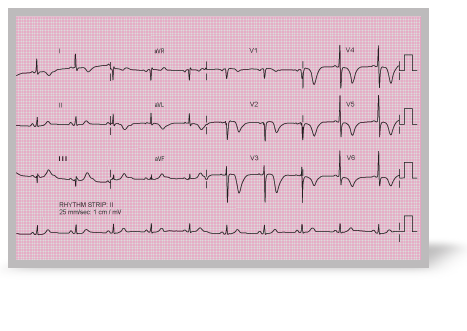
- Question five
The patient’s symptoms fail to settle despite aspirin, iv nitrate infusion, oxygen and morphine. You now have her 12-lead ECG.

Feedback
That’s partly right. Have another go.
Feedback
That’s partly right.
The ECG shows deep T wave inversion in the chest leads and in leads I and aVL. There is no ST segment elevation. This is compatible with a non-ST-segment-elevation MI or with unstable angina. The presence or absence of troponin release will distinguish. Patients with an acute coronary syndrome who have on going symptoms and/or dynamic ECG changes despite appropriate medical therapy should be considered for urgent coronary reperfusion. Due to the risk of bleeding, fibrinolytic therapy (thrombolysis) and GIIb/IIIa inhibitors are contraindicated in patients who have recently had major surgery.
Feedback
That’s not right. Have another go.
Feedback
That’s not right.
The ECG shows deep T wave inversion in the chest leads and in leads I and aVL. There is no ST segment elevation. This is compatible with a non-ST-segment-elevation MI or with unstable angina. The presence or absence of troponin release will distinguish. Patients with an acute coronary syndrome who have on going symptoms and/or dynamic ECG changes despite appropriate medical therapy should be considered for urgent coronary reperfusion. Due to the risk of bleeding, fibrinolytic therapy (thrombolysis) and GIIb/IIIa inhibitors are contraindicated in patients who have recently had major surgery.
Feedback
That’s right.
The ECG shows deep T wave inversion in the chest leads and in leads I and aVL. There is no ST segment elevation. This is compatible with a non-ST-segment-elevation MI or with unstable angina. The presence or absence of troponin release will distinguish. Patients with an acute coronary syndrome who have on going symptoms and/or dynamic ECG changes despite appropriate medical therapy should be considered for urgent coronary reperfusion. Due to the risk of bleeding, fibrinolytic therapy (thrombolysis) and GIIb/IIIa inhibitors are contraindicated in patients who have recently had major surgery.
